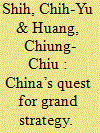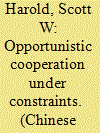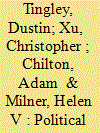|
|
|
Sort Order |
|
|
|
Items / Page
|
|
|
|
|
|
|
| Srl | Item |
| 1 |
ID:
138164


|
|
|
|
|
| Summary/Abstract |
As China’s power steadily rises, mutual role expectations between China and the United States become increasingly unstable. To ensure a mutually agreeable role for China, Chinese grand strategy has the double mission of presenting China as an accepted and respected matching power and of assuring the incumbent hegemonic power that China is a role-player. We apply the notion of national role style to analyse China’s grand strategy. We argue that China adopts the sociological role conception and examines the grand strategy of the rising power accordingly. Through examining China’s policy towards US arms sales to Taiwan, we show how a role-playing China has tried to execute a grand strategy to coach the incumbent hegemonic power into acknowledging China’s rise to the status of a matching power. We argue that the importance of maintaining a stable relationship with the United States has trumped China’s core national interest of unification, pertaining to US arms sales to Taiwan. In practice, China treats arms sales as a bilateral issue, and would rather appeal to sociological role expectations through a bilateral convention than through any general value. The United States, on the other hand, despite its willingness to cope with China in an exclusively bilateral format, has always tried to push China to accept universal rules at the expense of the alleged national differences between the two countries, thereby defeating the sociological role expectation.
|
|
|
|
|
|
|
|
|
|
|
|
|
|
|
|
| 2 |
ID:
138166


|
|
|
|
|
| Summary/Abstract |
Given its goal of building a ‘New-Type Great Power Relationship’ with the United States, why doesn’t China demonstrate its good will towards the United States by cooperating more proactively on sanctioning Iran over its nuclear enrichment activities, a key US foreign policy goal that is also in line with Chinese stated policy on nonproliferation? This essay describes Chinese views of nuclear non-proliferation, the oil trade, and Iran’s geo-strategic importance from the perspectives of specialists in China’s arms control community, experts on energy trade, Middle East specialists and grand strategists. It characterizes China’s relationship with Iran as one of ‘opportunistic cooperation within constraints’, arguing that China–Iran ties are largely transactional in nature, aimed at maximizing benefits to China but limited by Beijing’s concern to avoid irreparably damaging its relationship with Washington. Chinese observers describe the Islamic Republic as a valued non-US-aligned partner in a geostrategically critical region; they also appreciate its substantial oil exports to China and see it as accepting of China’s rise. The article concludes that China is likely to continue to strive to maximize its relations with Iran to as great an extent possible, while doing the minimum necessary to support the P5 þ 1 negotiations and sanctions processes.
|
|
|
|
|
|
|
|
|
|
|
|
|
|
|
|
| 3 |
ID:
138165


|
|
|
|
|
| Summary/Abstract |
A great deal of political economy scholarship has focused on how countries can attract foreign direct investment (FDI), and the effects of FDI on growth and political stability. A related topic that has received almost no attention, however, is that of divergent political reactions to inflows of FDI in the countries receiving investments. This is an oversight, because inward FDI flows are not equally welcomed by the host country and, in fact, often encounter strong political opposition. We study this phenomenon by examining political opposition to attempts by Chinese companies at mergers and acquisitions (M&As) with US firms. This is especially important given rapidly expanding Chinese M&A activity. We hypothesise that although most legal barriers to foreign M&As are based on national security considerations, objections on these grounds are often vehicles through which to channel other grievances, and that economic distress and reciprocity are also key drivers of political opposition. To test this theory, we constructed an original dataset of 569 transactions that occurred between 1999 and 2014 involving Chinese acquirers and American targets. We find that there is more likely to be opposition to Chinese M&A attempts in security sensitive industries, economically distressed industries, and sectors in which US companies faced restrictions in China’s M&A markets.
|
|
|
|
|
|
|
|
|
|
|
|
|
|
|
|
| 4 |
ID:
138167


|
|
|
|
|
| Summary/Abstract |
Under what conditions would a great power adopt a general strategy or selective strategies towards multiple weaker targets? This article seeks to answer the question through conceptual, theoretical, and empirical contributions. First, the essay discusses the conceptual significance of general and selective strategies in multilateral asymmetry. Second, the conventional wisdom suggests that external threats and domestic politics explain a great power’s foreign policy. Such theories may indeed explain certain types of foreign policy, but this article raises a structural theory to account for a great power’s multilateral asymmetric strategies, wherein regional structures and alignment relationships best explain the particular type of a great power’s foreign conduct. Third, the essay challenges the conventional wisdom whereby US–Soviet bipolarity in Cold War Europe was applicable to Cold War Asia. Based upon newly available Chinese, Russian, and American archives, China’s consistent behaviour in maritime East Asia and Indochina (1949–1982) demonstrates the virtues of a structural theory, and exposes the limits of alternative explanations.
|
|
|
|
|
|
|
|
|
|
|
|
|
|
|
|
|
|
|
|
|